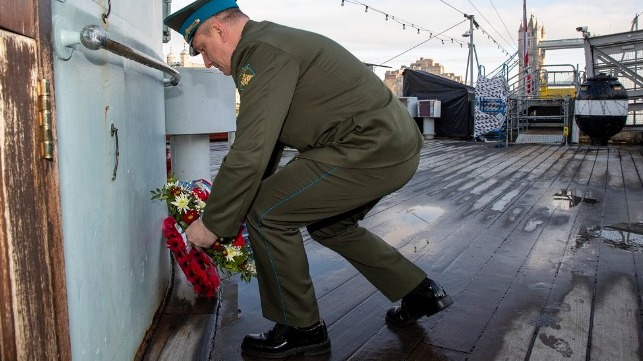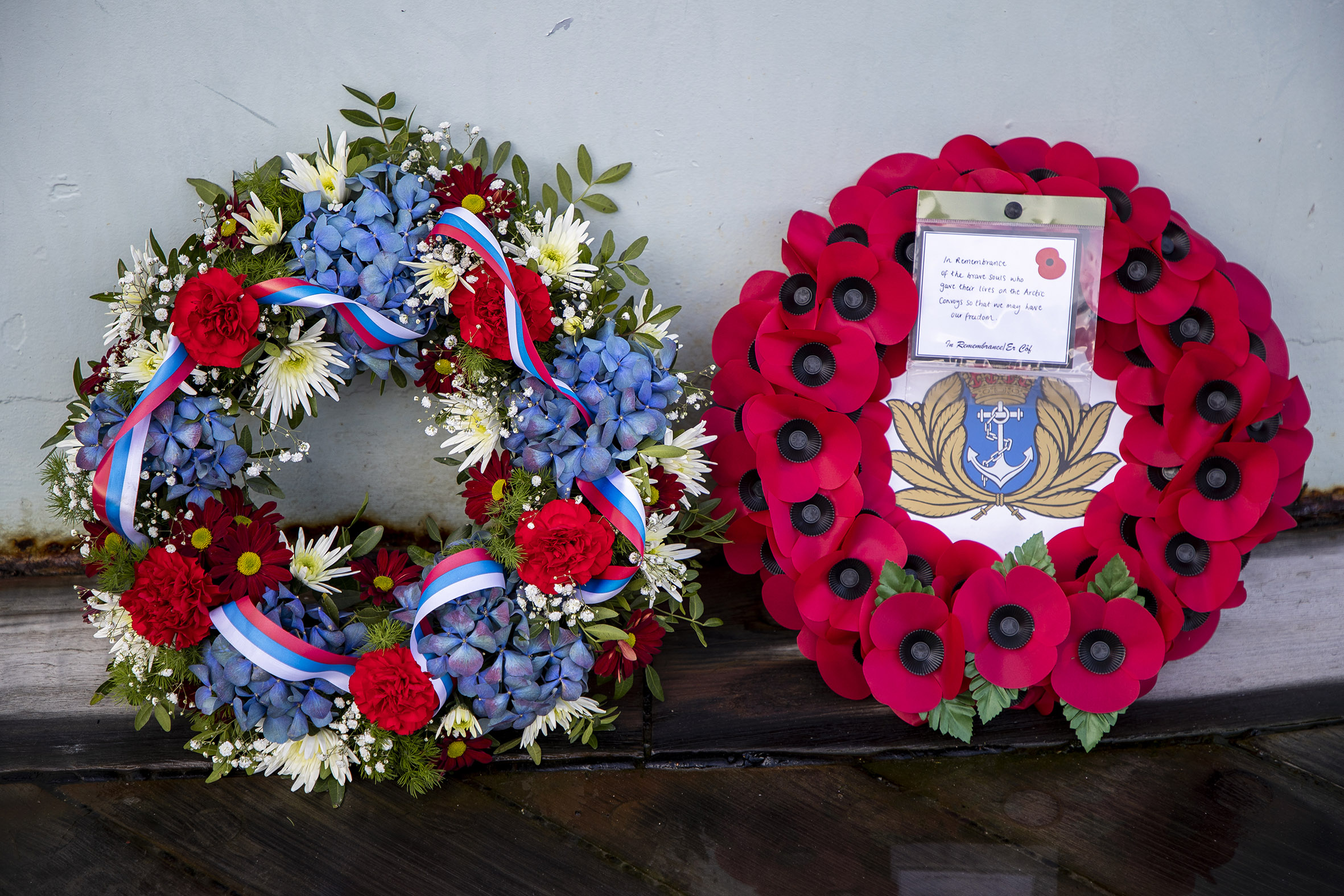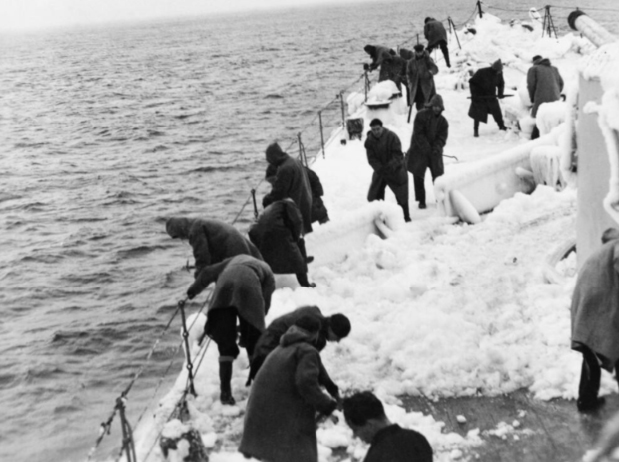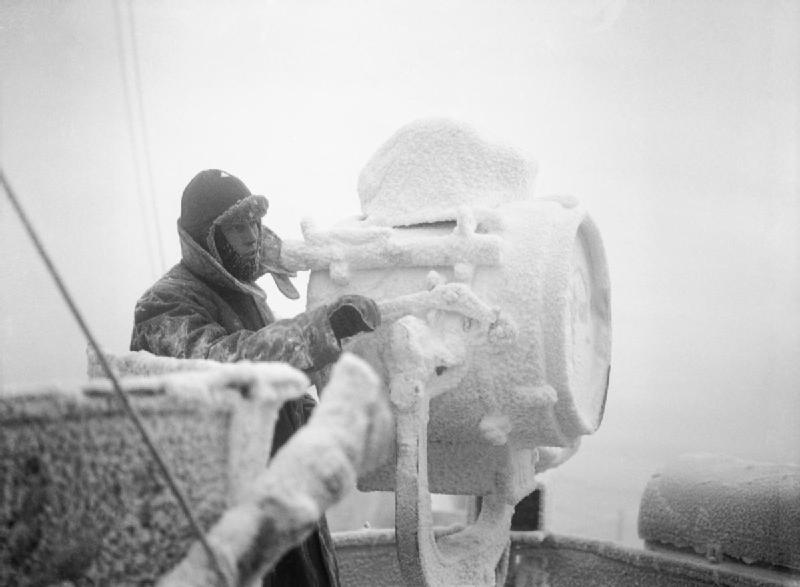UK and Russia Commemorate 75th Anniversary of WWII Arctic Convoys

Royal Navy and Russian military representatives have taken part in 75th anniversary commemorations of the end of a bitter four-year struggle to deliver vital aid to the Soviet Union and defeat Nazism.
The global pandemic scuppered plans for a major commemoration of the end of the convoys, which ran from the summer of 1941 until the defeat of the Third Reich in the spring of 1945.
Instead a ‘virtual commemoration’ was last month, when veterans joined senior political and diplomatic figures from Britain and Russia for an online discussion to underline the importance of the convoys – and to thank the dwindling number of men who endured what Churchill called ‘the worst journey in the world’.
That event sparked the idea of low-key physical commemorations at some of the key monuments to the convoys.
Commander James Buck, Harbor Master in Orkney, saluted the fallen commemorated by the monument on Hoy; adjacent Scapa Flow was home to many of the warships which escorted the convoys.
On HMS Belfast on the Thames, Rear Admiral Iain Lower, the Royal Navy’s Assistant Chief of Naval Staff (Policy), and the Russian Defence Attaché to the UK, Colonel Maxim Elovik, met on the quarterdeck for a service of remembrance and thanksgiving.
Since 2014, the Russian Federation has presented around 3,500 Ushakov Medals to Arctic Convoy veterans, honoring their “contribution to our common victory over Fascism," Col. Elovik said. It will resume presenting them to those eligible once the pandemic passes to ensure “that each award finds its hero”.
“Today we not only celebrate the shared history and joint achievements of Russia and the United Kingdom in World War 2, but also the true brotherhood in arms of our people, a bright example of which were the Arctic Convoys. The Allied seamen showed true heroism in their long and perilous sea passages, constantly attacked by enemy forces in the appalling weather conditions of the Arctic. The memory of these and other heroic examples of joint combat and mutual support continues to live in our hearts," Elovik said.

Russian Federation and Royal Navy wreaths aboard HMS Belfast (Royal Navy)

Crew of HMS Belfast remove snow during an Arctic Convoy run (Royal Navy)

Ice on a signal lamp aboard HMS Sheffield on an Arctic Convoy run (Royal Navy)

Merchantmen on Arctic Convoy duty, seen from the cruiser HMS Scylla (Royal Navy)
Col. Elovik placed a wreath on behalf of his nation alongside Admiral Lower’s beneath Belfast’s battle honors board.
“It was an absolute honour to have the opportunity to properly commemorate the service of all the courageous mariners who served in the Arctic convoys; on and under the sea, as well as in the air,” said Admiral Lower.
“In doing so, I am glad we could also celebrate our shared history of solidarity with Russia and its people. Having the ceremony on HMS Belfast is particularly poignant too as it has so many deep connections with this shared past.”
The wartime cruiser serves as a living memorial to the 3,000-plus sailors – Royal Navy and merchant seamen – who sacrificed their lives delivering more than four million tonnes of supplies: tanks, fighters, trucks, fuel, ammunition and food. Around 1,400 merchant ships made the perilous journey to ports in northern Russia during 78 convoys. Some 85 merchant ships never made it – nor 16 Royal Navy warships which provided escort for them in the face of attacks from the German surface fleet, U-boats and Luftwaffe.
HMS Belfast spent 18 months on Arctic Convoy duties between Christmas 1942 through to the spring of 1944, participating in the last battleship duel of World War II in Europe, the sinking of the Scharnhorst off the North Cape on Boxing Day 1943.
A belated 75th anniversary commemoration on the shores of Loch Ewe in north-west Scotland, where many convoys mustered before sailing, is planned for May 2021.
This article appears courtesy of Royal Navy News and may be found in its original form here.
The opinions expressed herein are the author's and not necessarily those of The Maritime Executive.
